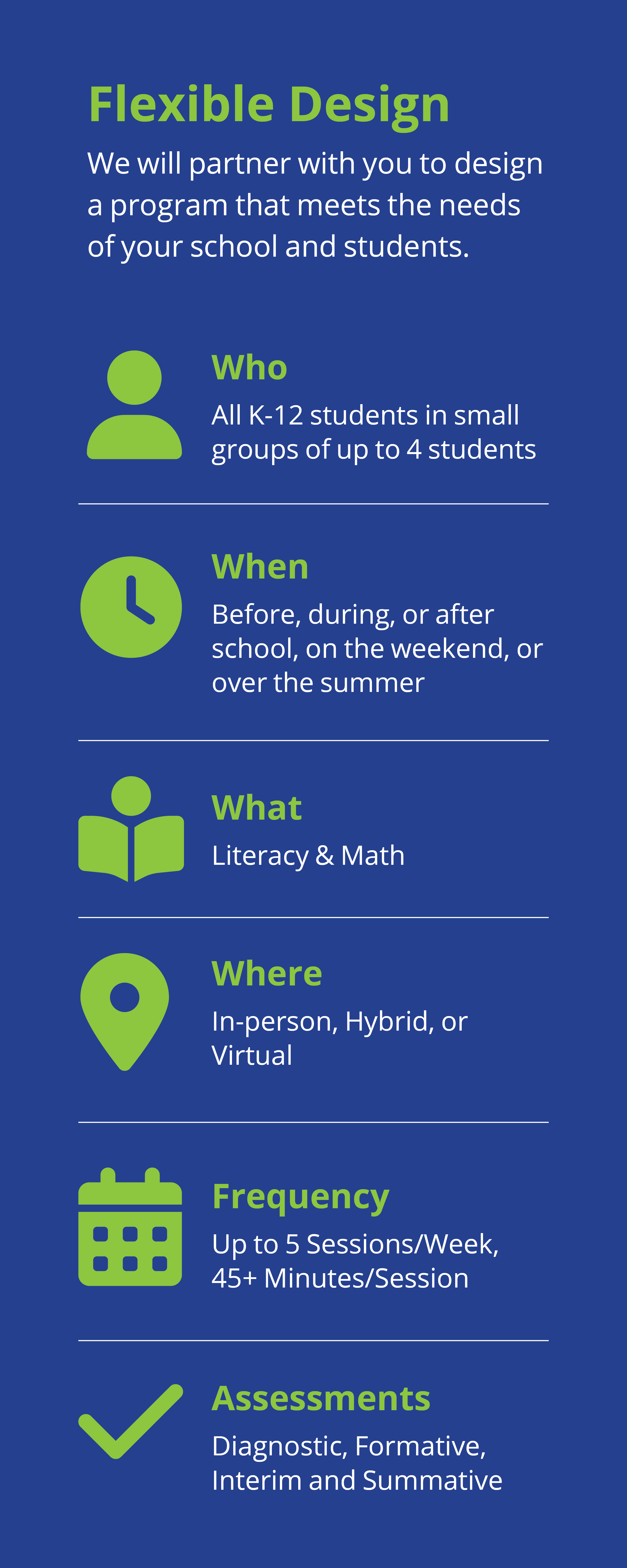Table of Contents
Continuing the post-pandemic trend of plummeting test scores, recent data from the Program for International Student Assessment (PISA) tests revealed that math scores for American students dropped to an all-time low. The PISA test, which assesses the literacy, math, and science skills of 15-year-old students (10th grade, typically) every three years, is coordinated by the Organization for Economic Cooperation and Development (OECD), an international organization consisting of 38 countries. While math scores fell considerably in all countries, the data showed a 13-point drop in math among 15-year-old students in the U.S., who averaged a 478 on the exam in 2022. That score represents an 18-point plunge from 2003, the first year the exam was taken.
These test results further emphasize the need for high-quality math tutoring in schools across the country. Let’s dive into math tutoring, its benefits, what to look for, and how Catapult Learning can help your district’s students improve in math.

What is math tutoring?
Math tutoring consists of individual, small-group, or larger-group instruction and reinforcement of skills in the subject of mathematics. Math tutoring teaches students how to perform certain mathematical concepts, calculations, and processes in a variety of math forms such as arithmetic, algebra, calculus, geometry, trigonometry, statistics, and others. Math tutoring also helps students improve their study habits and classroom skills while better preparing them for homework and exams.
Tutoring can occur as many times a week as is deemed necessary. However, research has shown that intensive, high-frequency tutoring that occurs for a minimum of 30 minutes per day, four or five days per week is much more effective than sessions that occur only once or twice per week.
What Are the Benefits of Math Tutoring?
Math tutoring offers a wide range of benefits, the most obvious being improvement in math topics resulting in higher test scores and grades. Here are some other of the many benefits of math tutoring:
- Personalized instruction and feedback: Students who struggle in math aren’t always able to keep up with their teacher and class in school. Having a math tutor who offers individual or small-group instruction as well as personalized feedback gives students the opportunity to fully focus on and comprehend the math concepts they may find difficult to grasp. Tutors can take the time to explain the concepts in a way that each student understands, which is a challenging proposition in a classroom of 20 students.
- Better study habits: Not only are tutors well-versed in the subject matter they teach, but they also can provide valuable tips and advice, such as how to improve study habits. Once a tutor works with a student, they can usually determine what specifically the student is struggling with and develop a way for the student to learn and study the concept that resonates with them.
- Improved time management: As a math tutor continues working with a student, they can evaluate what the student should continue doing, what can be improved upon, and what can be eliminated altogether. By helping a student become more efficient with their studying and work habits, they improve their time management, an important life skill.
- Higher confidence: Through personalized feedback and improved academics, students feel more comfortable and confident in class knowing they’re understanding the same concepts as their classmates and keeping up with the lessons.
When Should a Student Get a Math Tutor?
There are a few telltale signs to look for when determining whether a student needs the help of a math tutor. The most obvious is probably a slipping math grade. If a student was consistently receiving A’s or B’s in math and suddenly begins to get C’s or lower on their assignments and exams, they’re likely struggling enough to need tutoring.
But slipping grades may not be immediately noticeable. Before struggles in math produce lower grades, students may show signs of frustration in class and especially at home while trying to do homework or study for an exam. Some students may begin demonstrating signs of apathy toward math, and that’s what a tutor can help prevent before it reaches that point.
How Catapult Learning Can Help
Catapult Learning’s High-Dosage Tutoring solutions are designed to accelerate learning in math for all K-12 students. Our solutions work by activating existing and relevant knowledge, building prerequisite skills, and reinforcing foundational skills. A comprehensive, integrated approach for schools and families that supports the whole student and optimizes academic outcomes, High-Dosage Tutoring focuses on acceleration by reinforcing key skills in the current grade’s core content and providing additional supports when necessary1. Studies show that students who experienced learning acceleration models had better outcomes versus those who only experienced remediation2.
Our High-Dosage Tutoring curriculum, AccelerateMath, provides intensive, research-based grade-level support with a focus on high-impact prerequisite content and skills that benefits all students. For at-risk students, our High-Dosage Tutoring is most effective when combined with supplemental intervention services, like our AchieveMath intervention program. Our supplemental services and can lead significant growth to close opportunity gaps over the course of a single school year.
Perhaps most importantly, Catapult Learning’s highly qualified tutors serve as mentors and motivators, helping students build self-confidence and develop a love for learning. Tutors are provided with a wealth of supporting materials as well as ongoing training and coaching to assist them in assessing, motivating, and accelerating student learning in math.
For more information about Catapult Learning’s High-Dosage Tutoring for math, visit https://catapultlearning.com/programs/instruction/high-dosage-tutoring/ or download our brochure.
